
Former Vice Chair of the Federal Reserve Alan Blinder on Cryptocurrencies, Soft Landings and What's Really Happening with the US Economy Now.
The one and only Alan S. Blinder, former Vice Chair of the Federal Reserve and member of President Clinton’s Council of Economic Advisors, shines a brilliant light on some of today’s hottest economic topics — including the politicization of economic policy, the criminality of cryptocurrency, the likelihood of a soft landing, the prospect of a national digital currency, and more.

Liespotting — An Expert Reveals How To Know When You’re Being Deceived. Honestly.
There’s an epidemic of deception taking place, and while some lying has a valid function, it helps to know when you’re being deceived. Expert Pamela Meyer reveals why we lie, how to spot deception in work and life situations, and how she knew Bill Clinton’s claim that he “never had sex with that woman” was bs.
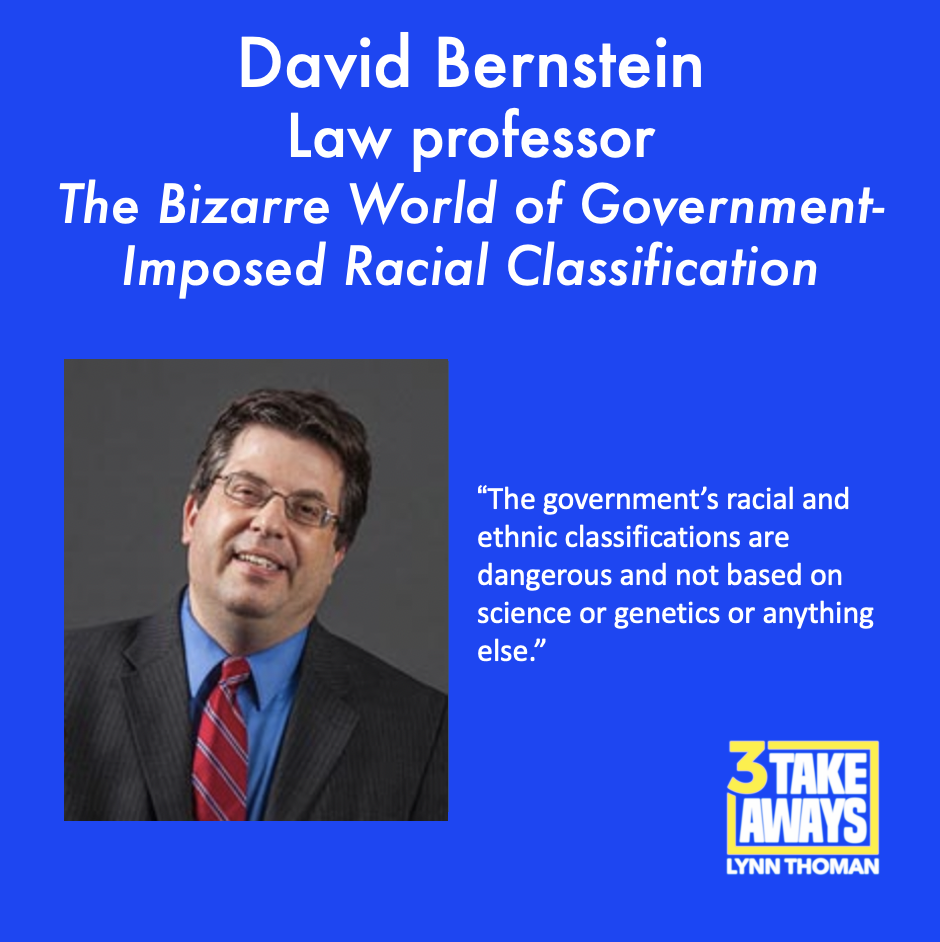
Classified: The Complex and Bizarre World of Government-Imposed Racial Classification. Listen, and Learn.
At a time when government-imposed racial and ethnic classifications are increasingly used to determine peoples’ rights, it’s important for them to make sense. According to law professor and author David Bernstein, they definitely do not. They’re absurd, have negative consequences, and are widely manipulated by “identity entrepreneurs.”
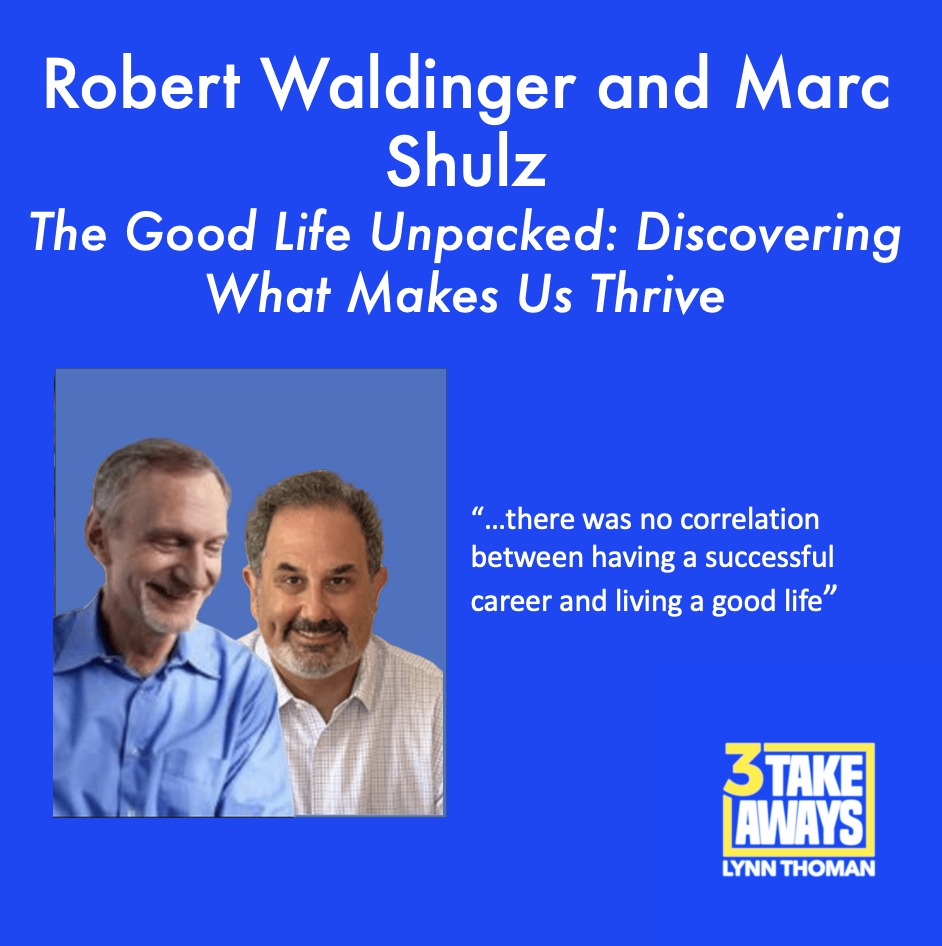
The Good Life Unpacked: Discovering What Makes Us Thrive with the Heads of Harvard's 80-Year Study
Unlock the secrets to a fulfilling life with Robert Waldinger and Marc Shulz, the heads of Harvard’s 80-Year Study of Adult Development, the longest, most in-depth, longitudinal study of human life and thriving ever done. Discover what a good life is, and how we can all have a better one. Even small choices, it turns out, can shape our lives and help us thrive. Learn the simple ingredients that make a good life, the U-shaped curve of happiness and how it's never too late to start. Get ready to be inspired and leave with three actionable takeaways!
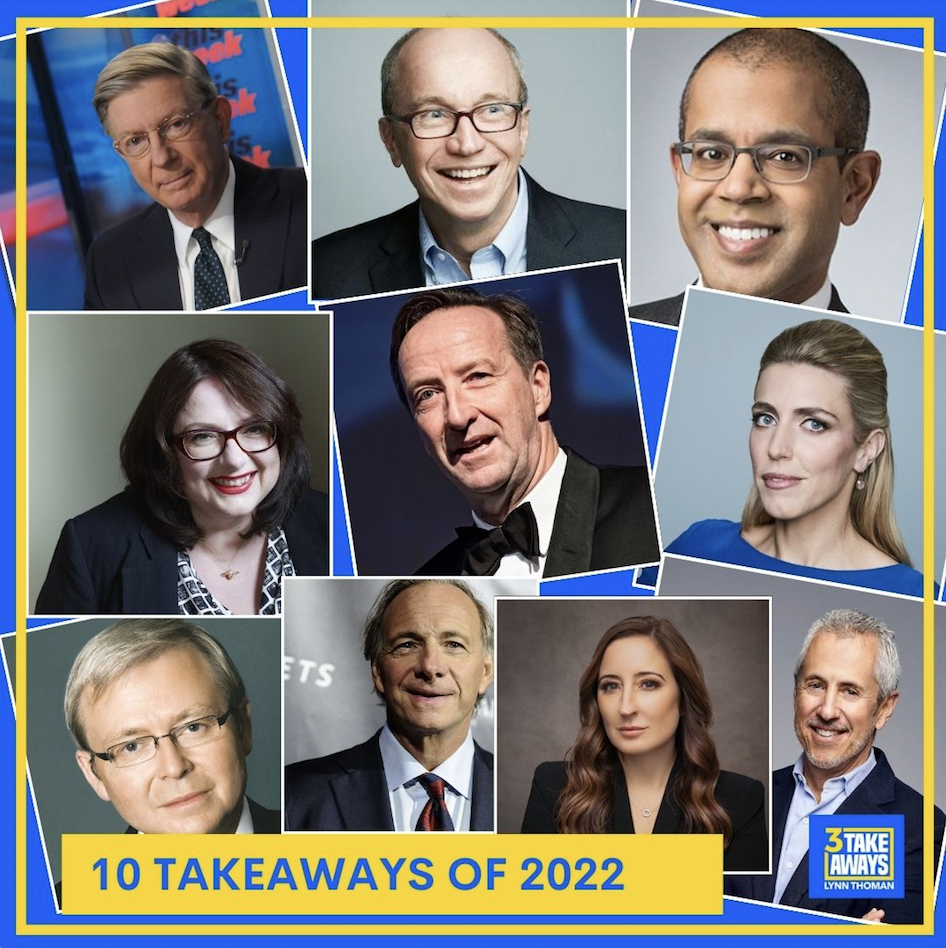
Which are the 10 Most Powerful and Compelling Takeaways of 2022? Listen and Find Out.
3 Takeaways features revealing conversations with the world’s foremost thinkers, business leaders, writers, politicians, scientists and other newsmakers, who each share three takeaways they consider vital. In this special year-end episode, we present the 10 most powerful and compelling takeaways of 2022.
Can you guess which takeaway is from each guest? The guests include:
Former Prime Minster of Australia
Former Chief of MI6
Founder of the world's largest hedge fund
7 other amazing guests

Former Senator Phil Gramm Explodes the Myth of American Inequality in an Eye-Opening Conversation
According to former Senator Phil Gramm, inequality in the U.S. is grossly overstated largely because it fails to take into account massive government aid to low income earners. The implications of this are huge, especially given the current debate about remaking capitalism. Don’t miss this important conversation.

The U.S. and the Holocaust: What did America Know and Do During the Greatest Atrocity of Our Time with Ken Burns' Co-Directors
What was America’s response to the Holocaust? What did we know and not know, do and not do, as the catastrophe unfolded? These questions resonate today, when the refugee crisis, immigration and antisemitism are making headlines. Don’t miss this powerful conversation with the co-directors of the new Ken Burns documentary film The U.S. and the Holocaust, Lynn Novick and Sarah Botstein.

Superabundance: Separating Fact From Myth About Human Flourishing on an Infinitely Bountiful Planet
Contrary to conventional wisdom, we are not living in an age of dwindling resources. Generations of people have been taught that the world's rapidly growing population is consuming the planet's natural resources at an alarming rate. But after analyzing the prices of hundreds of commodities and products over the last 100 years, Marian Tupy and Gale Pooley found that resources became more abundant as the population grew.
To their surprise, they found that we create ever more value out of natural resources, and that now is a time of superabundance and human flourishing. Don’t miss this compelling rationale for optimism.

Chip War: the Fight for the World's Most Vital Technology and the Staggering Vulnerability of the U.S.
The world as we know it relies on computer chips, and the most important ones are made largely in Taiwan. This renders the U.S. shockingly vulnerable as China continues saber rattling in the region. Don’t miss this enlightening talk with economic historian and author Chris Miller.

Why the Lies We Tell in Public Are So Destructive with Duke's Timur Kuran
Hiding what we really think can have devastating social consequences, and helps explain the rise of Donald Trump, why Harvey Weinstein got away with it for so long, the unreliability of election polls, and much more. Don’t miss this eye-opening conversation with Duke’s Timur Kuran.

Complicit: When Good People Turn a Blind Eye to Rape, Thievery, and Fraud. With Harvard’s Max Bazerman
Countless people knew what Harvey Weinstein, Elizabeth Holmes, and the Catholic Church were doing – but remained silent. Why do good people allow the horrific behavior of others? Harvard professor Max Bazerman explores this complicity and offers solutions.

What Does the Work of The Future Look Like? With MIT Professor David Autor
Why will tech and automation never lead to the demise of human work? What qualifies as “good” work? What role will robots and AI play in the fast-approaching future? David Autor, MIT professor and co-chair of the MIT Task Force on The Work of The Future, provides answers in this riveting and enlightening conversation.

The Person You Mean To Be and A More Just Future with Social Scientist Dolly Chugh
It’s counter-intuitive but true: letting go of being a good person is key to becoming a better one, and often times it starts with acknowledging our unconscious bias. Social scientist and best-selling author Dolly Chugh offers phenomenal insight that can benefit us both at home and in the workplace.

Is This Time Different? Eight Centuries of Financial Folly with Famed Economist Ken Rogoff
Harvard economics professor and former IMF Chief Economist Ken Rogoff is one of the world’s preeminent economic thinkers. Here he brilliantly dissects today’s U.S. economy and bluntly explains what must happen to tame inflation and sustain growth – and the major role China may play.
He is the co-author of This Time Is Different: Eight Centuries of Financial Folly.
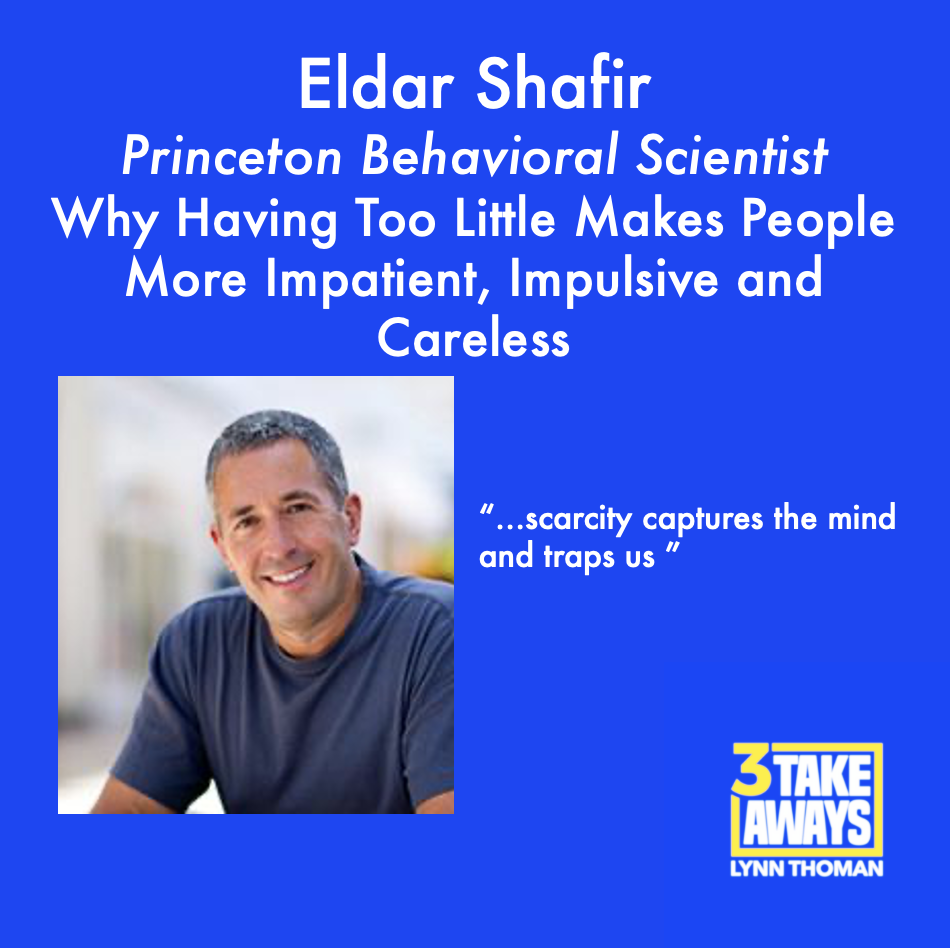
Why Having Too Little Makes People Perform Worse and Become More Impatient, Impulsive and Careless: Princeton Behavioral Scientist Eldar Shafir
Learn how scarcity of anything - money, food or social connections - affects our daily lives and leads us astray. Scarcity reduces both intelligence and control. Having too little preoccupies and taxes the mind, making life much harder. "Even smiling and being pleasant is hard when your mind is taxed. The employee snaps at rude customers ... The parent snaps at the child ... The server rings up the wrong item.”
Find out about the latest cutting edge behavioral science and how we can all manage scarcity for better satisfaction and success with Princeton behavioral scientist Eldar Shafir.
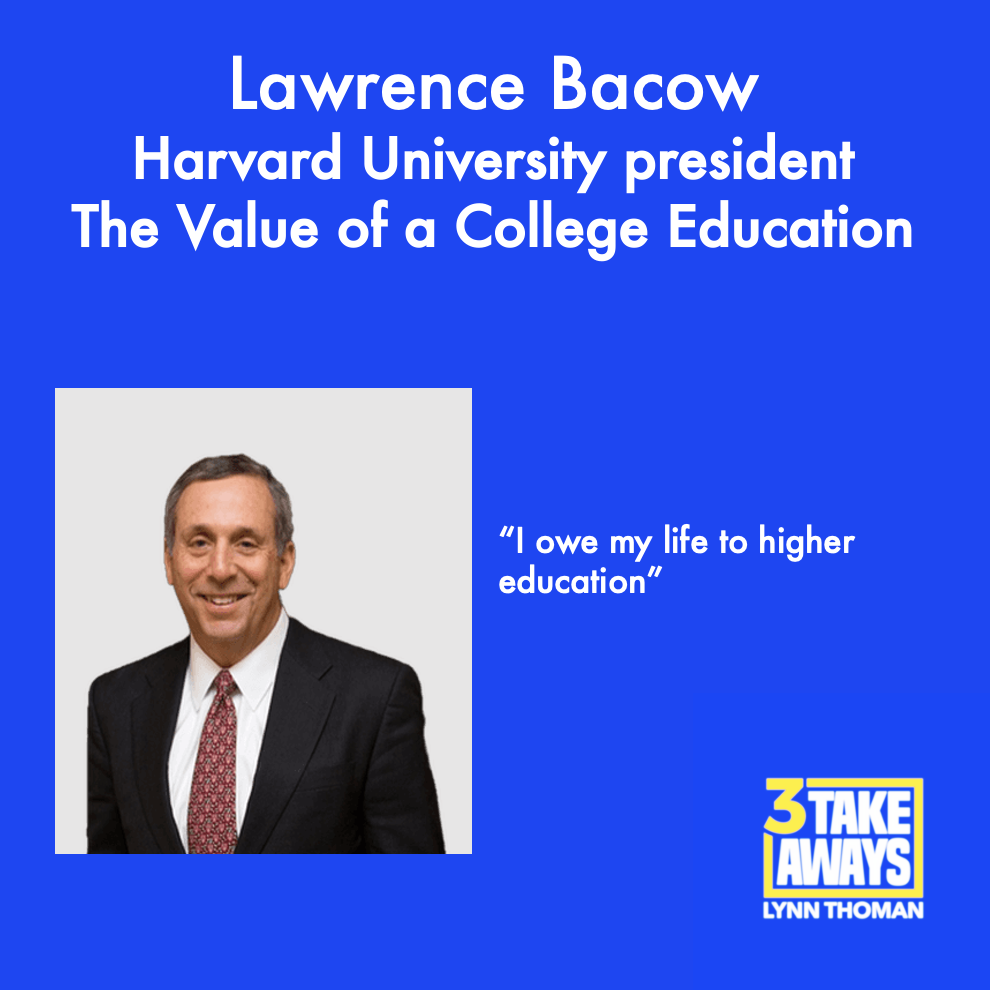
Harvard University President Lawrence Bacow: The Value of a College Education & Investing in the Future
Lawrence Bacow, President of Harvard University, shares how he sees the future of education and the values he leads by at Harvard. Learn the role of universities in a democracy, the importance of teaching students to think critically and why he believes the value of a liberal education is higher than ever.

Harvard Business School’s Bill Sahlman: What I’ve Learned Reading 10,000 Business Plans and Investing in Hundreds of Startups
Of the 10,000 business plans Bill Sahlman has read, only 3 companies met their plan. Find out what it takes to succeed. Entrepreneurs have to be really good at running tests and execution trumps idea. Jeff Bezos is the most effective experimentalist in history. Bill Gates did not invent word processing, the spreadsheet, or presentation graphics; rather he took ideas and out executed everyone else.

When Women Lead: A Groundbreaking Look at Bias, Leadership and the Future of Work with CNBC’s Julia Boorstin
The deck is still stacked against women in the workplace. Learn how some women dramatically defy the odds, and what both men and women can learn from them to succeed. Don’t miss this eye-opening conversation with CNBC Senior Correspondent Julia Boorstin.

The Exponential Age: How Accelerating Technology is Transforming Business, Politics and Society with Tech Seer Azeem Azhar
Technology is advancing at exponential speed, and humanity is having serious trouble keeping up. Azeem Azhar, a tech seer who has founded and sold four companies, shares his unique insights into what he calls the “exponential gap” and its impact on business and society.
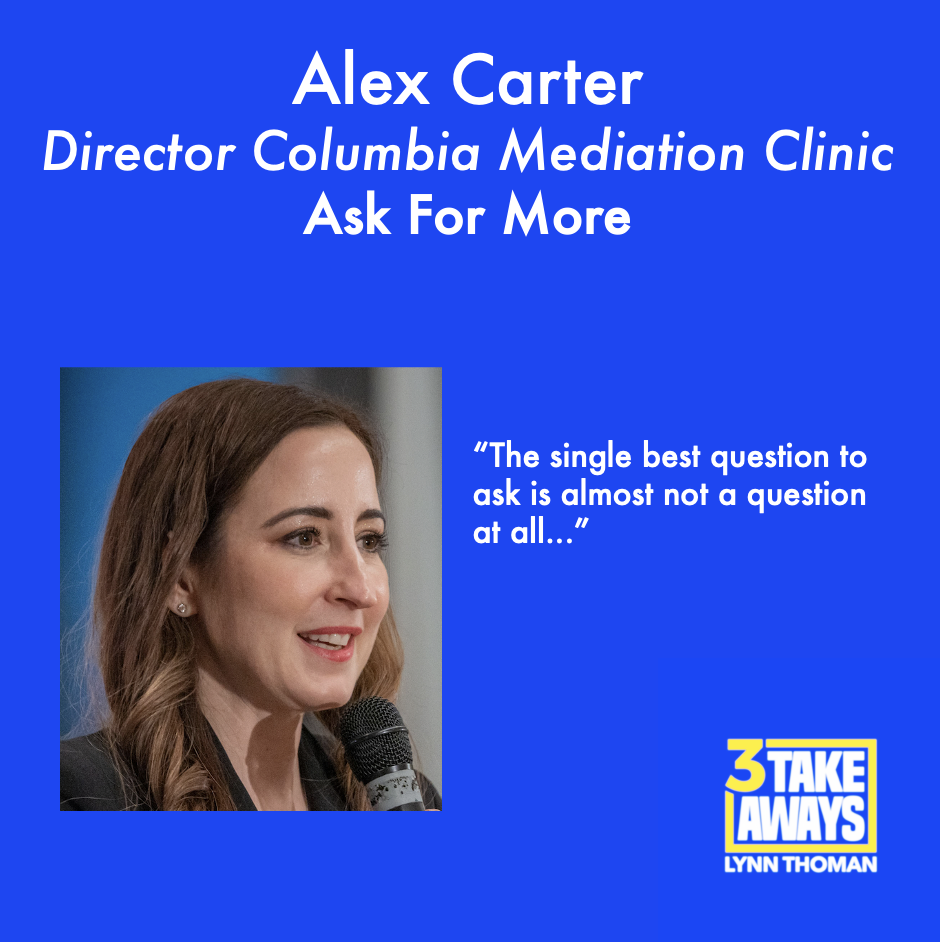
Ask For More: 2 Questions to Negotiate Almost Anything with Columbia Law School Mediation Clinic Director Alex Carter
Did you know that by asking better questions, you get better answers and better results from negotiations, as well as conversations? Learn what the 2 best questions are, and why these 2 questions work almost magically in negotiations as well as in conversations - including those with spouses, children, and colleagues.
Negotiation is not a zero-sum game. It’s an essential skill for your career that can also improve your closest relationships and your everyday life.
Alex Carter is Director of Columbia Law School’s Mediation Clinic. Her Wall Street Journal bestselling book is Ask For More.
